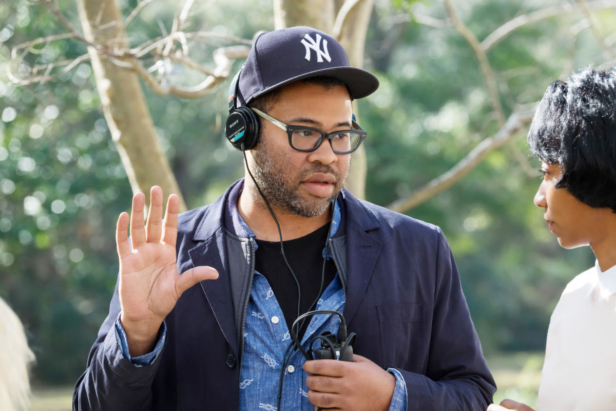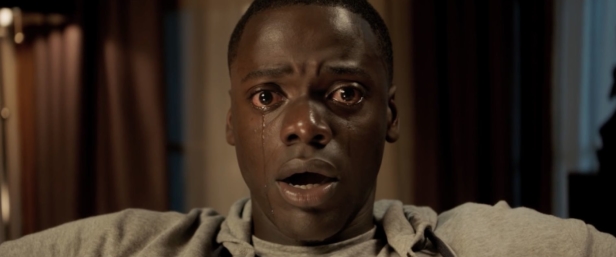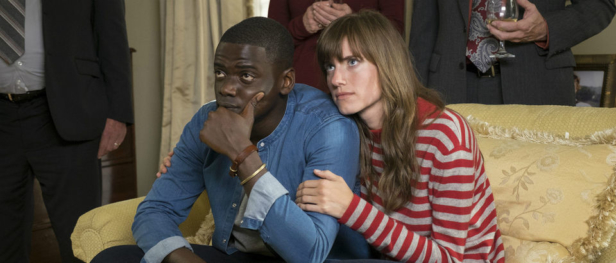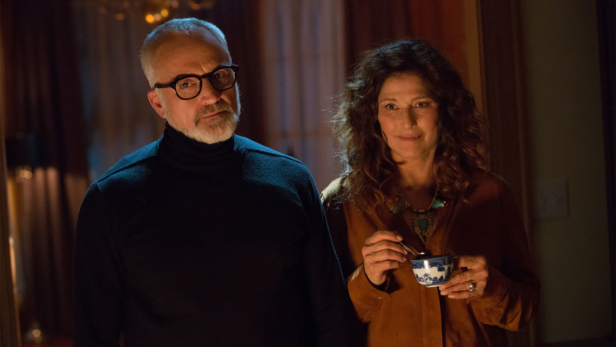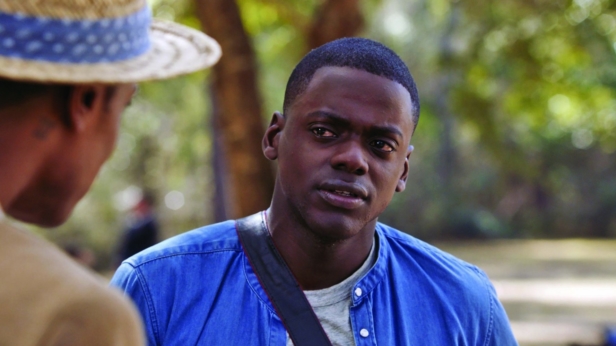Jordan Peele’s debut horror Get Out is finally released in the UK today after storming the US box-office. It’s crossed the $100 million mark, it’s got great reviews, and it is absolutely brilliant. You might know Peele best from his comedy work with Key And Peele and Keanu, but this is a superb horror movie and we’re very excited to hear that he plans to keep working in the genre. It’s confident, witty, incredibly clever and very scary, and you need to see it as soon as possible.
The film, which Peele describes as a “social thriller,” follows Chris (the superb Daniel Kaluuya) as he travels to meet the family of his white girlfriend Rose (Girls’ Allison Williams) for the first time. Her parents (Bradley Whitford and Catherine Keener) seem friendly enough and anxious to dispel any notions of racism (he would have voted for Obama a third time), but it feels like something sinister is going on…What’s beneath the smiles and “my man” endearments? We don’t want to say anymore in case of spoilers, so here’s the writer-director.
How did the idea for Get Out first come about?
The first little outline that I made was actually about a woman bringing her boyfriend to some event where all her old high school friends were, and it was based on that primal feeling of being an outsider. That you’re experiencing a gathering of people that know each other already. Really early on I realised that this is an opportunity to talk about race in a film.
The conversations in the film are so fantastically uncomfortable, every line feels loaded, was that fun to play with?
Yes. Even before it was a racial movie it was very based around the idea that you can get scares, thrills, suspense and intrigue within dialogue itself. One of my biggest touchstones is The Stepford Wives, with a satirical edge it just plays on the reality of how human beings behave. It’s just one notch from being this truly absurd over the top reality. So yeah, for me it’s a social thriller.
I’d been writing several social thrillers at the same time, really more than anything because I wanted to give myself the most fun thing I could possibly write, and at some point Get Out emerged as one that felt like it was reaching completion, but even as that happened I still didn’t think anyone would ever make it! So it actually teaches me a good lesson, which is: write that which is the most fun to write and worry about selling it later.
Did you always see yourself directing it?
No, so it basically took me five years to figure out what the outline was, what the premise was. I’m the kind of writer that needs to know everything about it before I put pen to paper and start writing the script. By the time I sold the pitch and I started writing the script, I still didn’t think I was going to direct it. And I was maybe halfway there, I was writing the party scene and at some point in there I realised I was the only person that could direct this movie. So I reached out to the producers and told them and they totally got it, and thank god they did.
Some of the Key And Peele sketches are essentially mini horror movies, but did it feel at all strange making the genre jump?
No, it’s totally natural. It’s my favourite genre, I’ve had a lot of great experiences with comedy but I was very ready to jump into this one. I’ve got about four other movies I want to do in the social thriller category so this is, in some ways, the beginning of the rest of my career, I think.
The cast is absolutely fantastic. Did you have anyone in mind when you were writing?
I did not have anyone in mind actually. The characters in my mind operated almost like a comic book image in a way, there were not real people, and they were sort of representations. Then casting’s such a fun part of it because each performer you put in a role sometimes really changes it, but certainly always adds something to the way you’ve been picturing a character.
So after I cast the movie I did a rewrite to get the characters in the voices that seemed like they should have with these actors. It was very fun, and over time you see the whole picture get coloured in. That’s how I describe the casting process. It’s like you’ve been planning a painting for five years and someone just finally told you what colours you need. And it changes the entire picture in a very cool way.
Daniel Kaluuya is incredible…
Once we found him, it just became very clear. It was certainly clear to me from the get-go that he was perfect for Chris and I think by the time he came in and auditioned, he convinced everybody else who maybe had doubts for whatever reason.
He’s so good in this movie, and I think the really important quality he has is that he has this familial vibe, you feel like you know him, you feel like he represents you, like maybe he’s a friend or a brother, but also he feels extremely perceptive, in the moment and intelligent.
It was very important to me that this character is someone that you feel is not making the dumb decision, that this was meant to be a movie to cater to anyone that ever wants to yell at the screen in a movie theatre when a protagonist does some stupid shit. I did not have to alter the character at all with Daniel’s casting.
I have to mention Bradley Whitford too, his grin just works so well!
Yeah and I had pictured somebody a little bit bigger, more intimidating, he’s described in the original screenplay as a barrel chested man, a real bear hug of a man, and then Bradley is sort of a different animal. He’s a silver fox kind of dude, and he turned from a guy who might have some sort of woodsy plaid on to somebody a little more dressed like Steve Jobs.
The film was made last year before the Presidential election. How does it feel bringing it out now?
It’s interesting because when I first wrote the film we were in this era, which I’ve been describing as the post-racial lie era in America. We had a black president and the whole conversation of race was kind of hushed up. “If you speak of the devil he shall appear,” the notion that the conversation about racism is perpetuating it.
Now we live in a time when obviously racial tensions are very clear and present, and so I think the movie will be actually feel more welcome now. I think people are engaged with the topic, and I think the use of genre in this conversation will add some fun to the topic to be honest, a topic that’s not much fun at all, but I think that this is a film where you can escape from it all and focus on the genre and the popcorn and you can go yell at the screen but then you can also use it as a reference point in conversation.
It’s also obviously so rare to see a horror film with a black protagonist.
Absolutely. I mean, that was one of the realisations that helped me realise that this could fill a missing gap in the genre and the conversation. I think one of the central themes of this film on a satirical level is that black people are really loyal horror fans and we go to the theatre, we yell at the screen, and yet the genre seriously lacks representation of our skin but also our perspective and experience.
So the sunken place in this movie, which is sort of a state of mind, is very much a metaphor for us being in these darkened theatres yelling at these screens, but we can’t affect it and there’s a marginalisation there.
We’ve got time for one last question, so: what was the first horror movie you saw?
It probably would be The Fly. Cronenberg’s The Fly, it scared the bejesus out of me but it also intrigued me, and I remember that feeling of pride that I had somewhat of a pleasant experience watching something so dark.
Get Out is in UK cinemas now. Read our review here and keep up with the latest news with the new issue of SciFiNow.
